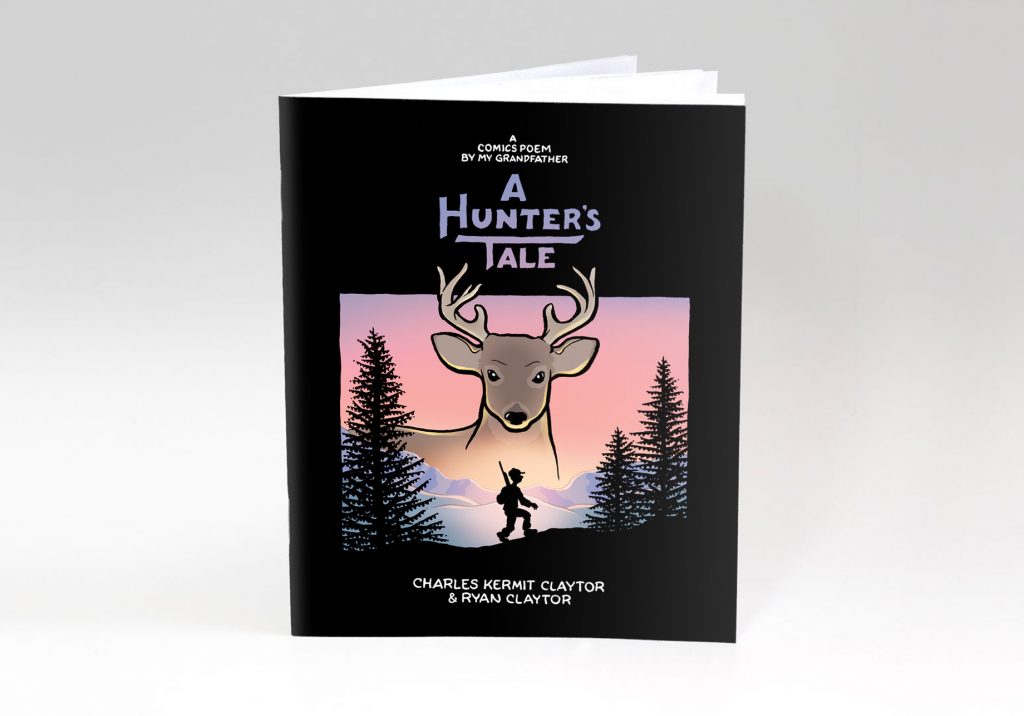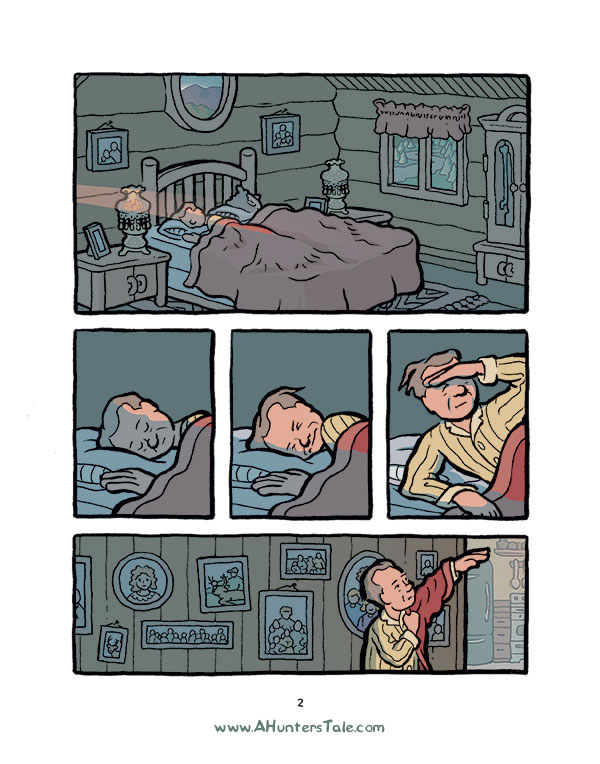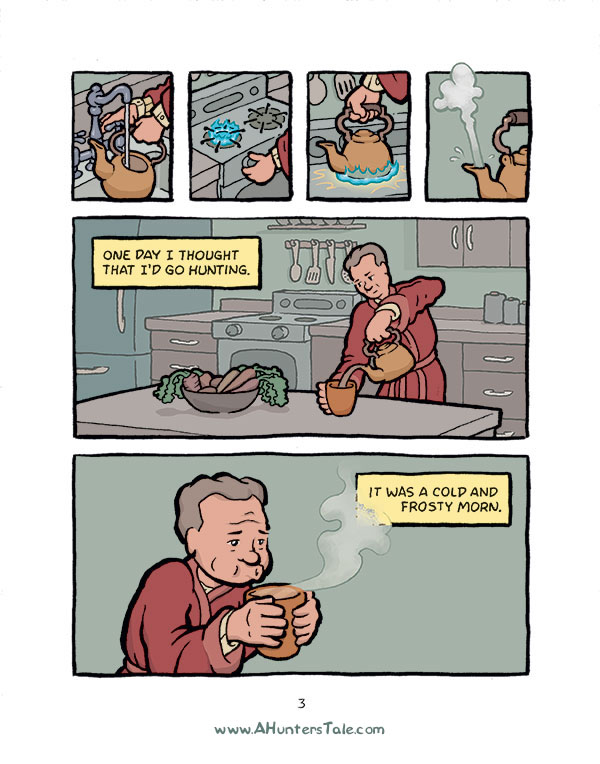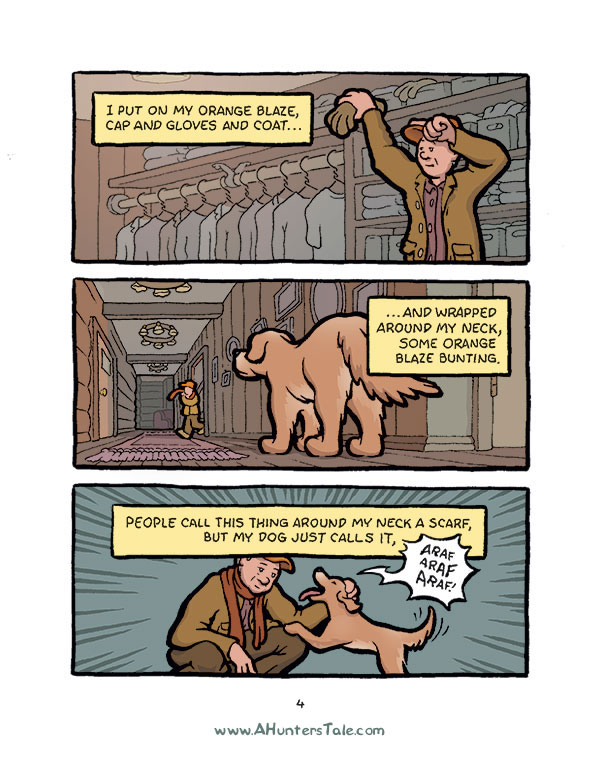Publisher’s note: This interview between Daniel Elkin and Ryan Claytor happened in October, timed to coincide with the launch of Ryan’s Kickstarter campaign. Between now and then, Kickstarter announced their intent to move forward with a conversion to a blockchain protocol, which has been highly controversial in the comics community. Fieldmouse Press, our parent publisher, has written an in-depth letter to Kickstarter addressing our concerns, however, this interview does not address those concerns. – A.

Daniel Elkin: Hey Ryan, we’ve talked a little about your new project, A Hunter’s Tale, but give me the pitch for the book. What is it and why do I want it?
Ryan Claytor: Hey, Daniel. First, thanks a bunch for giving me some time on SOLRAD.
Regarding my new comic book, A Hunter’s Tale, it’s actually a poem written by my late grandfather, Charles Kermit Claytor, which I very recently finished adapting and illustrating in comics form. It’s hard for me to express how much this book means to me. It’s about two seemingly disparate subjects (a hunter and his prey) who form an unlikely understanding of one another. At its core, it’s about different world views finding empathy for one another.
Daniel, I don’t think you’re the only person who needs this story in their life right now, I think we all do. This poem has resonated with me for a long time, and it’s only recently that I really started trying to understand why this was my absolute favorite poem my grandpa ever wrote. In our increasingly divisive culture, where we quickly dismiss viewpoints of others unlike our own and can easily de-friend and filter away those unwanted opinions, A Hunter’s Tale makes a point of approaching another outlook with compassion and respect.

DE: Compassion and respect for differing viewpoints is certainly something we are in increasingly short supply of nowadays, and there are a myriad of reasons for that. But before we get into any sort of political or cultural discussion, I’d like to focus on the work itself. I’m interested in your terminology. You say that you are “adapting and illustrating” your grandfather’s work. Are you thinking that this book nestles somewhere in the “comics poetry” genre? Does your cartooning add to the theme of the poem, or are you being faithful to your grandfather’s vision and doing a straight illustration job?
RC: I’d certainly call this “comics poetry,” as the script was originally a stand-alone poem (never intended to be made visual). However, A Hunter’s Tale is a very narratively driven poem, as is my approach to comics, so this project likely strays from what I see as a more typical poetic approach in which the reader interprets each phrase and attempts to tease out meaning. By comparison, I think A Hunter’s Tale will be a quicker and more accessible read.
Regarding my “adaptation” of the poem, I am remaining vehemently faithful to my grandfather’s words. Every line in the comic will appear as it did in his writing. In fact, the back matter of the book will include my grandpa’s original poem, so interested readers will be able to read his words as they were originally published. The visuals and the pacing of the comic are my own, but my hope is that they serve to bolster mood and setting, ultimately reinforcing my grandfather’s original intent.
DE: Thanks for bringing up the visuals and pacing of the book. What was your process here? How did you make the decisions you made and how do you feel these choices add to the poem? Have they changed it in any way? Are you inserting your own thoughts about the poem through your choices?
RC: Well, the poem is thoughtful and contemplative. Consequently, I felt like it needed a similarly languid and considered visual introduction. Because of this, you’ll see about 2 or 3 pages of silent panels before the words of the poem begin to appear. There are also similar instances throughout the poem in which I did my best to interpret the varying moods. If there’s a somber passage, I try to allow space for emotion to be felt through a silent panel or two, in ethereal sections I’d negate panel structure altogether to evoke an unconfined experience. So, I’d imagine my choices will have some bearing on how the poem is read, but I did my best to simply augment what was already present in my grandfather’s words.

DE: By adding the visual layer to the poem, I imagine that it unavoidably alters the reading experience. So, I would imagine that this would add to how the poem is interpreted. What do you think your grandfather would think about this project?
RC: I’ve thought about that a lot over the course of making this book. Of course, I hope he would fancy it as being a worthwhile and fulfilling collaboration. It’s part of why I’m remaining so staunchly devoted to using his words verbatim. While it’s impossible to know definitively what my grandfather’s opinion would be about this new interpretation of his work, I think I can get a sense of it from sharing pages with my grandfather’s son (MY DAD!), who tells me that he can’t wait to buy a bunch of copies to brag about his dad and son in one fell swoop.
DE: Ah, the legendary double brag! It is the dream, isn’t it? I think we should start wrapping this up, so I’ll ask a “big” question now and then follow it up with something smaller. Ultimately, Ryan, what do you hope A Hunter’s Tale will add to the dialogue around us, as a society, finding less and less compassion and respect for differing viewpoints, and how do you hope it will do this?
RC: The theme of this poem/comic/book is not complicated, it’s one of empathy. Simple, yet challenging. However, if characters, like a hunter and prey can find empathy for one another, perhaps as fellow humans, we too can muster a similar respect toward each other. I understand that’s a big ask, but my hope is for this book to act like therapy; it may not always elicit wholecloth changes, but participating in it creates a greater awareness of how we conduct ourselves as we interact with others in this world.

DE: Final question. Why use Kickstarter to get this book published?
RC: Well, I think the obvious first reason is that it would be awfully nice to have the cost of printing the book paid for upfront. That’s essentially my funding goal for this campaign. I really just want this project to see print.
However, in addition to fundraising for creative projects, in the comics sphere, Kickstarter is turning into another avenue with incredible potential for new outreach, promotion, and distribution.
As you know, I’m a professor at Michigan State University where I’ve spearheaded the MSU Comics Minor and teach the comics studio courses. I’ve even coached some of my students through successful crowd-funding campaigns. Then, several months ago, I watched my 7-year-old son have a better 2-week sales period for his first comic book (on Kickstarter) than ANY 2 week sales period for ANY book I’ve created in nearly 20 years of making comics.
That experience made me hopeful that I might be able to follow in his footsteps and find some new readers for my own work, as well.
SOLRAD is made possible by the generous donations of readers like you. Support our Patreon campaign, or make a tax-deductible donation to our publisher, Fieldmouse Press, today.

Leave a Reply